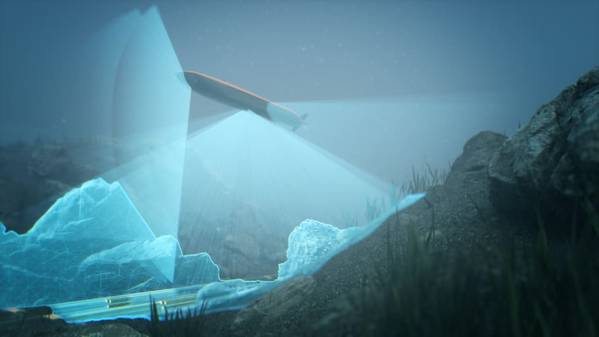
Norway's Kongsberg Maritime is presenting its HUGIN Edge medium-size autonomous underwater vehicle (AUV) at this week's Oceanology International event which started Tuesday in London.
According to the company, based in Norway, the HUGIN Edge offers "exceptional durability and reliability," and is designed for deployment from unmanned surface vessels (USVs), small surface vessels, and from shore.
Measuring less than 4 meters long, HUGIN Edge, the newest member of the HUGIN family of AUVs, weighs approximately 300kg.
Kongsberg says the AUV is packaged with the latest battery technology to provide more than 24 hours of operation at depths of up to 1,000 meters.
The general arrangement includes the next generation of Kongsberg's synthetic aperture sonar, a high-frequency multibeam echosounder and a swappable camera or sub-bottom profiler. This configuration has been designed to cover most geophysical survey requirements, as well as mine countermeasures, rapid environmental assessment, and search & recovery, as well as surveys of critical national infrastructure.
Per Kongsberg, the HUGIN Edge AUV is configured for ease of deployment from all platforms and offers "class-leading" sensor and navigation performance.
"The new design combines elements of HUGIN’s carbon monocoque approach, used with success for the last 20 years, coupled to extensive hydrodynamic modeling to refine the hull’s low-drag shape," Kongsberg said,
Among the significant new features and capabilities found in the new AUV, Konsgberg highlighted an innovative forward-looking sonar design providing 3D sensing capabilities for improved trajectory planning and directional collision avoidance, coupled to traditional forward-scanning methodology.
Also, Kongsberg said, to enable greater interoperability, the vehicle is equipped with the latest open interfaces for integration to third-party planning and mission management tools.
"The mission planning capabilities provides a higher-level mission planning interface, requiring less specialist knowledge and input by the operator. Mission objectives may include sounding density or detection probability, enabling the AUV to calculate the actual waypoints, operational parameters and sensor configuration. In-mission adaptive execution allows HUGIN Edge to make several decisions autonomously, continuously replanning during mission execution as more information about the surrounding environment is gathered by the sensors," the company said.
Automated LARS
The design has been developed around Kongsberg's automated Launch and Recovery (LAR) with battery charging through inductive power providing true over-the-horizon operations.
"This capability removes the human from the field of operations, enabling supervision from afar to minimize operational risk, maximise safety and deliver the lowest carbon footprint," Kongsberg said.
Richard Mills, Vice President of Marine Robotics Sales at KM, said: “Since the first dive of HUGIN on 7th March 1993 it has evolved into the most successful commercial off-the-shelf autonomous underwater vehicle ever made.
"In that time, the shape has changed, from a smooth low-drag design to a more traditional cylindrical hull form focused on modularity and providing a flexible configuration. Over the last few years, we have released the high-performance HUGIN Superior, the pinnacle of survey capabilities within autonomous vehicles, and HUGIN Endurance which stretches the operational range to 2,200 line kilometers in a single dive.
"HUGIN Edge returns to our original design philosophy of a smaller low-drag body using the common architecture and user interface, enabling interoperability of all HUGIN systems. Hydrodynamic efficiency is combined with optimized sensor integration to provide the best of both worlds: efficiency and productivity.”